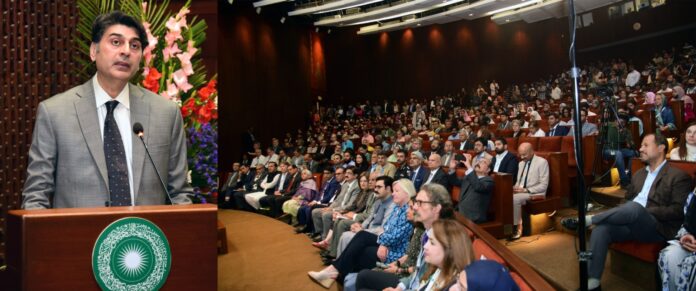- Advertisement -
KARACHI, Apr 15 (APP):Minister of State for National Health Services, Regulations and Coordination Dr. Malik Mukhtar Ahmed Bharath, Tuesday, stated that the government is fully committed to achieve the goals of universal health coverage and significant measures were underway to improve primary healthcare facilities.
“Through our new national health and population policy, we plan to gradually enhance government health expenditure from 1% of GDP to 3% and bring in primary health care focused reforms in collaboration with the provincial governments and partners,” he said while addressing the inaugural session of National Symposium on Primary Health Care here at Agha Khan University Karachi.
Agha Khan University (AKU), in partnership with the Federal Ministry of National Health Services Regulation and Coordination and Provincial Health Departments, hosted the Primary Health Care (PHC) Symposium, as part of the PHC Learning Agenda (PLA) Initiative.
The event brought together senior representatives from federal, provincial, and district health offices. Prominent figures in attendance included Chief Minister Sindh Syed Murad Ali Shah, Sindh Health minister Dr. Azra Pechuho, Balochistan Health Minister Bakht Muhammad Kakar, Advisor to the Chief Minister Khyber Pakhtunkhwa Ihtisham Ali, besides health experts, and development partners.
The state minister emphasized the need to make the national health system more resilient and responsive to digital transformation by scaling up digital health solutions for data management and tele-medicine at the primary health care level. A program has been conceived for setting up tele-medicine centers across Pakistan with an estimated cost of Rs 33 billion, he added.
Reiterating the government’s commitment to elimination of polio, TB and hepatitis C and other communicable diseases, Dr. Mukhtar informed that the PC-1 of a Rs 67.7 billion Hepatitis elimination project has been approved while the federal government is taking collaborative efforts with provinces to strengthen preparedness and response capacities of our health system for future pandemics.
“We are convinced that strengthening primary health care is the most inclusive, effective and efficient approach to enhance people’s physical and mental health that is a cornerstone of a sustainable health system,” he stated vowing that it will remain our main policy direction for our new national health and population policy for the next 10 years with a renewed focus for building resilient, equitable and efficient health systems which are more adoptive, inclusive and responsive.
The state minister commended AKU and the Gates Foundation for convening a dialogue on primary health care and said that all of us recognize the importance of this symposium in aligning efforts across provinces and development partners to achieve universal health coverage through primary health care approach.
Sindh Chief minister Syed Murad Ali Shah, while inaugurating the event, termed improving access to quality primary health care services as a key priority of his government and said that this initiative allows us to learn from successful models and ensure that no community is left behind.
He commended the collaboration between academia, development partners and provincial governments to strengthen PHC, which according to him is the backbone of Pakistan’s health system, especially in rural areas, where over 60% of the nation’s population live. Investing in and improving PHC is a cost-effective way to reduce disease burden, enhance health outcomes, and promote equity, he maintained.
President of AKU Dr. Sulaiman Shahabuddin, said, “At Agha Khan University, we believe that primary health care is not just a component of the health system -it is its very foundation,” of people-centered, accessible and equitable health systems required to achieve universal health coverage and the health-related Sustainable Development Goals in Pakistan.
Through initiatives like the PHC Learning Agenda, we are working hand in hand with national partners to generate evidence and insights that can transform policy and practice across Pakistan, he stated and also highlighted the objectives of the symposium.
The symposium highlighted five priorities for strengthening PHC: integrating health and population services to address rapid population growth; re-configuring PHC to tackle non-communicable diseases and mental health; partnering with the private sector; improving service quality; investing in domestic health financing and reducing reliance on external aid.
Backed by the Gates Foundation, UNICEF, and the World Bank, the symposium also featured discussions around financing, governance, health information, quality of care, and community engagement.

